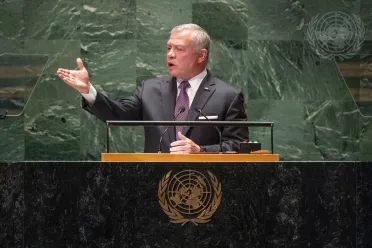Statement
Statement summary
ABDULLAH II IBN AL HUSSEIN, King of Jordan, said that more than 345 million people face food insecurity, daily hunger, or starvation. Among the most vulnerable are 108 million refugees. And 40 per cent of these refugees are children. “Yet these numbers cannot really convey the tragedy,” he said. Refugees are mothers, fathers and grandparents, who have made perilous journeys to save their families. They are young people with big dreams, and little children who deserve the chance to dream big. They depend on the international community for their survival, and multiple UN agencies provide vital services to help meet the need. “But in recent months, one by one, these agencies have been delivering difficult news — a severe shortfall in international funds has forced them to cut support,” he said.
In Jordan, where refugees make up over one third of the 11 million population, cuts have already thrown the lives of hundreds of thousands of refugees into uncertainty, he continued. “Fear and want bring on sharp increases in the number of refugees fleeing to Europe and beyond, on journeys that too often end in tragedy,” he said. Jordan has done everything to secure a dignified life for refugees. Nearly half of the almost 1.4 million Syrians it hosts are under 18 years of age. For many of these young people, Jordan is the only place they have ever known. Over 230,000 Syrian children have been born in Jordan since 2011. “We are sharing precious resources to help them meet basic needs — food, energy, and especially water,” he said. Jordan is among the water-poorest countries in the world. It faces these pressures just when another crisis has hit the region: climate change.
“Syrian refugees’ future is in their country, not in host countries,” he added. And the fact is refugees are far from returning. On the contrary, more Syrians are likely to leave their country as the crisis persists. And Jordan will not have the ability nor the resources to host and care for more. Jordan’s case is a microcosm of the entire region, which, he said, will continue to suffer until the world “helps lift the shadow” of the Palestinian-Israeli conflict. “Without clarity on where Palestinians’ future lies, it will be impossible to converge on a political solution to this conflict,” he said. Five million Palestinians live under occupation with no say in their lives. Yet every UN resolution since the beginning of the conflict recognizes the equal rights of the Palestinian people to a future of peace, dignity and hope.
“We can see the Israeli people actively defending and engaging in the expression of their national identity. Yet, the Palestinian people are deprived of that same right,” he continued. The basic requirement for that right is the establishment of their own independent and viable State, on 1967 lines with East Jerusalem as its capital. For its part, Jordan remains committed to safeguarding Jerusalem’s identity, he continued, also urging sustainable funding for the United Nations Relief and Works Agency for Palestine Refugees in the Near East (UNRWA). “We must protect young Palestinians from extremists who prey on their frustrations and hopelessness by making sure they continue to learn at schools under the blue flag of the United Nations, as the alternative will be the black flags of terror, hate and extremism,” he stressed.

